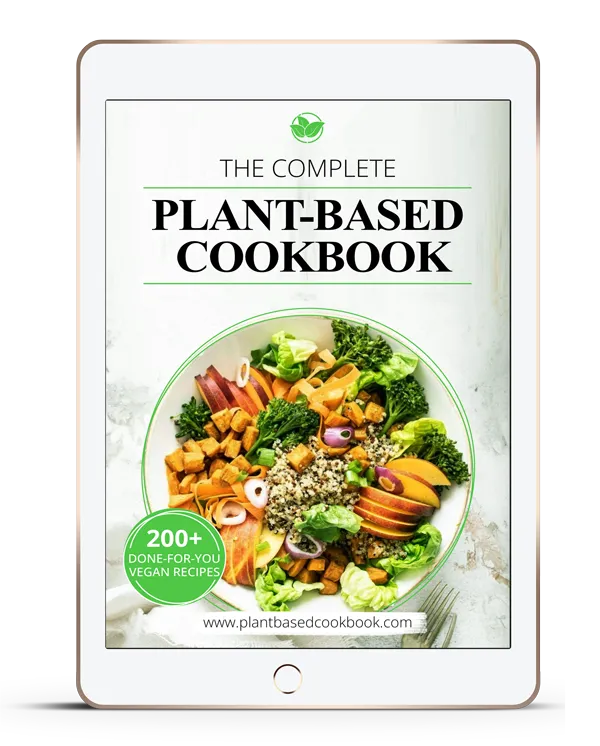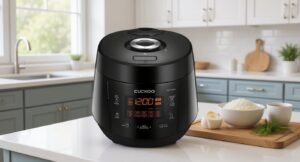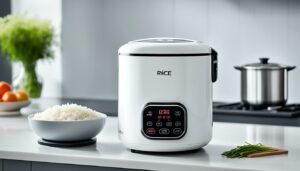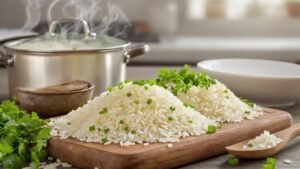Have you ever wondered if there’s a better way to cook boiled eggs than the traditional stovetop method?
Perhaps you’ve heard whispers of a secret technique that yields perfectly cooked eggs every time. Well, the rumors are true.
We’re about to reveal the game-changing method that will revolutionize your boiled egg game: cooking them in a rice cooker.
Yes, you read that right. Your trusty rice cooker isn’t just for making rice any more. It can also be your ticket to achieving boiled egg perfection.
But how exactly does it work? What are the benefits? And most importantly, how can you master this technique?
Well, consider us your guides on this egg-citing journey as we unlock the secrets to how to cook boiled eggs in a rice cooker. So, get ready to redefine your breakfast routine and become a pro in the art of rice cooker boiled eggs.
Table of Contents
ToggleWhy Use a Rice Cooker for Boiled Eggs?
Using a rice cooker for boiling eggs offers several advantages. Firstly, it provides convenience and consistent results every time.
The rice cooker allows for hands-free cooking, allowing you to set it and forget it. It also eliminates the need for constant monitoring and reduces the risk of overcooking or undercooking.
Additionally, using a rice cooker for boiling eggs minimizes cleanup as it contains the mess within the appliance itself.
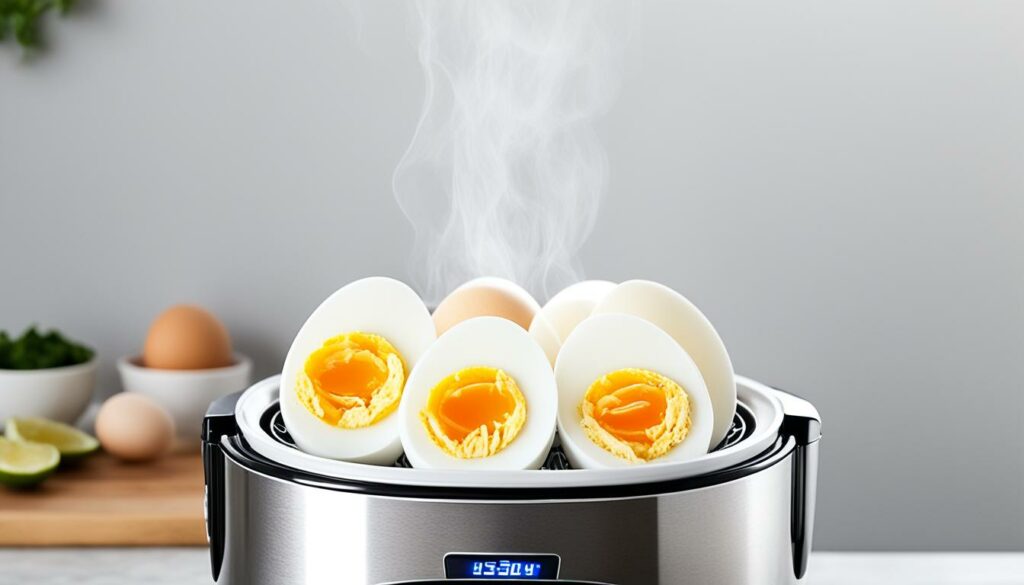
Getting Started: Equipment and Ingredients
Before you start cooking boiled eggs in your rice cooker, it’s important to gather the essential equipment and ingredients. In this section, we’ll guide you through choosing the right rice cooker, explain why fresh eggs are essential for rice cooker boiled eggs, and provide an optional tip for easier peeling using baking soda.
Of course, a simple egg cooker like the one below will do a stand-up job but, if you want the best results with the ultimate convenience, you need to keep reading!
- SATISFACTION GUARANTEED: Dash Rapid Egg Cooker is the ORIGINAL (and most trusted) egg cooker on the market, for perfect eggs, your way, EVERY TIME, we guarantee it.
- SIX EGG CAPACITY: Cook up to 6 eggs in soft, medium, or hard boiled firmness, while saving time and water. Eggs come out consistently perfect with shell easy to peel, and clean up is snap.
- VERSATILE: This is the PERFECT appliance for picky eaters, large families, or those who have busy schedules. Hard boiled eggs, soft boiled eggs, poached eggs, scrambled eggs, individual omelets, and all within minutes of the push start button - it couldn't be easier.
- COMPACT plus LIGHTWEIGHT: Weighing 1lb, the Dash Rapid Egg Cooker is your MUST-HAVE for that first apartment, smaller kitchen, college dorm life, or camper/rv traveling. Plus, its sleek design and trendy color options will accent any kitchen space (bonus all included accessories fit inside, taking up even LESS space).
- INCLUDES: Dash Rapid Egg Cooker includes a poaching tray, omelet tray, 6 egg holder tray, measuring cup, recipe book and recipe database access (all non-electric parts are dishwasher safe).
Choosing the Right Rice Cooker
When selecting a rice cooker for boiling eggs, it’s crucial to consider specific features that ensure optimal results. Look for a rice cooker with a dedicated egg boiling function or a steaming tray designed for cooking eggs.
These features will provide the necessary support and control for perfectly cooked boiled eggs.
Fresh Eggs Matter
Using fresh eggs is key to achieving the best results when cooking boiled eggs in a rice cooker. Fresh eggs have a firmer egg white and a creamier yolk, resulting in a more enjoyable texture and flavor. Choose eggs that are within their expiration date and avoid using eggs that have been sitting in your refrigerator for too long.
Optional: Baking Soda for Easier Peeling
To make peeling boiled eggs easier, you can add baking soda to the water in your rice cooker. Baking soda raises the pH level of the water, making the egg whites less likely to stick to the shell. Add about half a teaspoon of baking soda to the water before cooking the eggs to enjoy effortless peeling.

Cooking Perfect Boiled Eggs (Times and Techniques)
Achieving the perfect texture for boiled eggs in a rice cooker requires precise cooking times and techniques. Whether you prefer soft-boiled, medium-boiled, or hard-boiled eggs, we’ve got you covered. Here’s how to cook each type:
Soft Boiled Eggs (6-8 Minutes)
Soft-boiled eggs are a delightful option for those who enjoy a runny yolk. To achieve the desired consistency, follow these steps:
- Fill your rice cooker with enough water to cover the eggs.
- Place the eggs gently into the water.
- Cook for 6-8 minutes, depending on how runny you like your yolk. Keep in mind that cooking times may vary depending on your rice cooker model.
- Once the eggs are cooked, carefully remove them from the rice cooker using a spoon or tongs.
- Immediately transfer the eggs to a bowl of ice water to stop the cooking process and make them easier to peel.
Medium Boiled Eggs (10-12 Minutes)
For a slightly firmer yolk with a creamy center, opt for medium-boiled eggs:
- Fill your rice cooker with enough water to cover the eggs.
- Gently place the eggs into the water.
- Cook for 10-12 minutes, adjusting the time based on your personal preference and rice cooker model.
- Remove the eggs from the rice cooker and plunge them into an ice bath to stop the cooking process.
Hard Boiled Eggs (13-15 Minutes)
If you prefer a fully set yolk, hard-boiled eggs are the way to go:
- Add enough water to your rice cooker to cover the eggs.
- Place the eggs gently into the rice cooker.
- Cook for 13-15 minutes, adjusting based on your preferred level of doneness.
- Transfer the eggs to an ice bath immediately after cooking to cool them down rapidly.
Using the Steamer Tray (if available)
If your rice cooker comes with a steamer tray, you can use it to cook your eggs:
- Fill the rice cooker pot with water, ensuring it remains below the level of the steamer tray.
- Place the eggs in the steamer tray, making sure they are evenly spaced.
- Insert the steamer tray with the eggs into the rice cooker.
- Follow the cooking times mentioned above for soft, medium, or hard-boiled eggs.
- Once cooked, remove the steamer tray and transfer the eggs to an ice bath.
Cooking without the Steamer Tray
If your rice cooker does not have a steamer tray, you can still cook boiled eggs using the water immersion method:
- Fill the rice cooker pot with water, ensuring it covers the eggs.
- Add the eggs directly into the water.
- Cook using the recommended cooking times for soft, medium, or hard-boiled eggs.
- After cooking, remove the eggs from the rice cooker and place them in an ice bath.
| Texture | Cooking Time |
|---|---|
| Soft Boiled Eggs | 6-8 minutes |
| Medium Boiled Eggs | 10-12 minutes |
| Hard Boiled Eggs | 13-15 minutes |
The Secret to Easy Peeling
The Science Behind the Ice Bath
One of the challenges with boiled eggs is peeling them without causing damage to the egg white. To achieve easy peeling, we recommend using an ice bath to quickly cool the eggs.
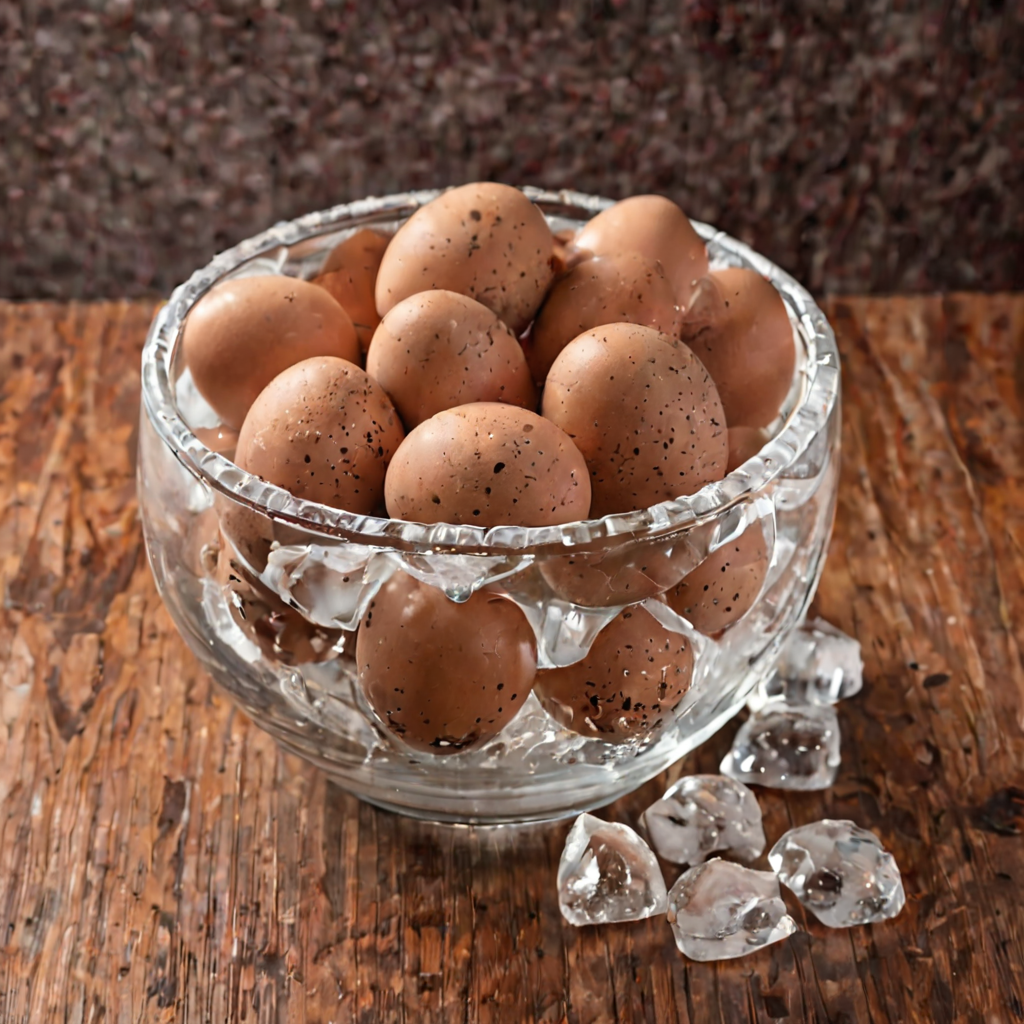
The ice bath method involves transferring the boiled eggs from the hot water directly into a bowl filled with ice and cold water. This rapid cooling process causes the egg white to contract, separating it from the shell and making it easier to peel.
The science behind the ice bath lies in the temperature shock that occurs when the hot eggs meet the cold water. This creates a small air pocket between the egg white and the shell, facilitating the separation during peeling.
Cooling Eggs Quickly
When it comes to cooling the eggs effectively, timing is crucial. After boiling the eggs, immediately transfer them to the ice bath to prevent them from continuing to cook. Let the eggs soak in the ice bath for at least 10 minutes, ensuring they are thoroughly cooled before peeling.
The ice bath not only cools the eggs quickly but also helps to halt the cooking process and maintain the desired texture of the boiled eggs. It is important to note that if the eggs are not cooled sufficiently, they may become too difficult to peel.
Peeling Techniques for Flawless Results
Once the boiled eggs have been properly cooled in the ice bath, it’s time to peel them. Here are a few techniques for achieving flawless results:
- Gently tap the boiled egg on a hard surface to crack the shell.
- Roll the egg between your hands, applying gentle pressure to loosen the shell.
- Start peeling from the wider end of the egg where the air pocket is located.
- Peel the shell carefully, making sure to remove it along with the thin membrane to avoid pulling away chunks of the egg white.
By following these peeling techniques, you can enjoy beautifully peeled boiled eggs with intact and smooth egg whites.
Beyond Breakfast: Recipes for Boiled Eggs
Boiled eggs are not just breakfast staples; they can be used to create delicious dishes for any meal. Whether you’re looking for a quick snack or a satisfying main course, the versatility of boiled eggs is truly remarkable. Here are some creative recipes that showcase the endless possibilities of using boiled eggs:
Deviled Eggs
Deviled eggs are a classic appetizer that never fails to impress. The creamy filling paired with the perfectly cooked egg white creates a delightful combination of flavors and textures. Sprinkle some paprika on top for an extra touch of color and taste.
Egg Salad
Egg salad is a timeless dish that can be enjoyed on its own or in sandwiches. The creamy and tangy dressing paired with the boiled eggs creates a satisfying and flavorful salad. Add some diced celery, chopped green onions, and a hint of dijon mustard for an extra kick.
Ramen Eggs (Ajitama)
Ramen eggs, also known as ajitama, are the perfect accompaniment to a piping hot bowl of ramen. These soft-boiled eggs have a creamy yolk and a soy-based marinade that adds a savory umami flavor to the dish. Serve them on the side or slice them in half and place them on top of your ramen for a delightful and satisfying meal.
Cobb Salad with Boiled Eggs
A classic Cobb salad combines fresh greens, crispy bacon, juicy tomatoes, creamy avocado, tangy blue cheese, and of course, boiled eggs. The eggs add a rich and protein-packed element to this flavorful salad. Drizzle some homemade vinaigrette over the top for a truly delicious and nutritious meal.
Troubleshooting: Common Issues and Solutions
While cooking boiled eggs in a rice cooker is relatively straightforward, some common issues may arise. In this section, we’ll address these problems and provide solutions to help you overcome any difficulties you may encounter.
Cracked Eggs During Cooking
If you experience cracked eggs during the cooking process, there are a few possible causes and preventive measures you can take:
- Ensure that you are using fresh eggs that are not already cracked or damaged.
- Place the eggs gently into the rice cooker, avoiding any sudden impacts or drops.
- Consider using a rack or steamer tray to provide additional support and prevent direct contact between the eggs and the rice cooker’s heating element.
Greenish Ring Around the Yolk
One common issue that can occur when cooking boiled eggs in a rice cooker is the appearance of a greenish ring around the yolk. This discoloration is harmless but can be unappealing. To avoid the greenish ring:
- Use a timer to ensure that you do not overcook the eggs. The greenish ring is often caused by overcooking.
- Immediately transfer the cooked eggs to an ice bath to halt the cooking process and prevent the greenish ring from forming.
Difficulty Peeling Eggs
Peeling boiled eggs can sometimes be challenging, but there are a few techniques that can help make the process easier:
- After cooking, gently tap the eggs on a hard surface to crack the shell, then roll them between your hands to loosen the shell.
- Peel the eggs under running water or in a bowl of water, which can help separate the shell from the egg white.
- Consider adding a teaspoon of baking soda to the cooking water, as it can help make the eggs easier to peel.
By following these troubleshooting strategies, you’ll be better equipped to handle any issues that may arise when cooking boiled eggs in your rice cooker.
| Problem | Solution |
|---|---|
| Cracked Eggs During Cooking | Use fresh eggs, handle them gently, consider using a rack or steamer tray. |
| Greenish Ring Around the Yolk | Use a timer, transfer eggs to an ice bath immediately after cooking. |
| Difficulty Peeling Eggs | Tap and roll the cooked eggs, peel under running water, add baking soda to the cooking water. |
Conclusion: Boiled Egg Mastery with Your Rice Cooker
Boiling eggs in a rice cooker is a versatile and easy cooking technique that yields consistent results. With the convenience and reliability of using a rice cooker, you can master the art of boiling eggs effortlessly. The benefits of mastering boiled eggs in a rice cooker are numerous.
A Versatile and Easy Cooking Technique
The rice cooker provides a convenient way to cook boiled eggs without the need for constant monitoring. Simply set it and forget it, allowing the rice cooker to do the work for you. This hands-free cooking method ensures consistent results every time, whether you prefer soft, medium, or hard-boiled eggs.
Experimenting with Flavors and Recipes
Once you’ve mastered the basic technique of boiling eggs in your rice cooker, it’s time to get creative. The versatility of rice cooker boiled eggs opens up a world of possibilities to experiment with various flavors and recipes. Add different herbs, spices, or sauces to infuse your eggs with new flavors, or incorporate boiled eggs into salads, sandwiches, or other dishes for a protein-packed addition.
| Benefits of Mastering Boiled Eggs in a Rice Cooker |
|---|
| Convenience and hands-free cooking |
| Consistent results every time |
| Minimal cleanup |
| Versatile cooking technique |
| Ability to experiment with different flavors and recipes |
Bonus Tip: Repurposing Leftover Egg Whites
After boiling your eggs, you may find yourself with leftover egg whites. Don’t let them go to waste! We have creative suggestions for repurposing those unused egg whites, allowing you to make the most out of your cooking endeavors.
Angel Food Cake
One delightful way to utilize leftover egg whites is by making a light and fluffy Angel Food Cake. This classic dessert is not only delicious but also a perfect showcase for the airy texture that egg whites provide. We’ll provide you with an easy-to-follow recipe that will have you enjoying a heavenly treat.
Meringue Cookies
Another excellent option for using up leftover egg whites is to create melt-in-your-mouth Meringue Cookies. These sweet, delicate treats are made by whipping the egg whites with sugar until they form stiff peaks, resulting in a crisp exterior and a soft, chewy center. We’ll share a simple and irresistible recipe that will surely satisfy your sweet cravings.
Frittata or Omelette
If you prefer savory dishes, repurposing egg whites in a flavorful Frittata or fluffy Omelette is a great choice. These versatile egg-based dishes can be customized with your favorite vegetables, cheeses, or meats. We’ll provide you with a basic recipe to get you started and inspire you to get creative in the kitchen.
Safety Note: Storing Boiled Eggs
When it comes to storing boiled eggs, it’s essential to follow proper safety guidelines to maintain their freshness and prevent any potential issues. We’ll provide you with helpful tips on how to store boiled eggs safely to ensure their quality and avoid any unpleasant surprises.
FAQ
Why should I use a rice cooker for boiling eggs?
Using a rice cooker for boiling eggs offers convenience and consistent results. It allows for hands-free cooking, reduces the risk of overcooking or undercooking, and minimizes cleanup.
What equipment and ingredients do I need to cook boiled eggs in a rice cooker?
You’ll need a rice cooker suitable for boiling eggs, fresh eggs, and optional baking soda for easier peeling.
How do I cook different types of boiled eggs in a rice cooker?
For soft-boiled eggs, cook for 6-8 minutes. Medium-boiled eggs require 10-12 minutes, and hard-boiled eggs need 13-15 minutes.
Can I use the steamer tray in my rice cooker to cook boiled eggs?
Yes, if your rice cooker has a steamer tray, we’ll explain how to use it for boiling eggs. If not, we’ll guide you through cooking without it.
How do I achieve easy peeling of boiled eggs?
The secret to easy peeling is using an ice bath to quickly cool the eggs. This prevents the egg white from sticking to the shell. We’ll provide tips for effective cooling and techniques for flawless peeling.
What recipes can I make with boiled eggs?
Boiled eggs can be used to make deviled eggs, egg salad, ramen eggs (ajitama), and Cobb salad with boiled eggs. We’ll provide delicious recipes for these dishes.
What should I do if I encounter common issues while cooking boiled eggs in a rice cooker?
We’ll address problems such as cracked eggs during cooking, a greenish ring around the yolk, and difficulties peeling the eggs. Troubleshooting strategies and solutions will be provided.
What are the benefits of mastering boiled eggs in a rice cooker?
Using a rice cooker for boiling eggs offers versatility and easy cooking. It provides convenience and consistent results. We’ll also encourage you to experiment with flavors and recipes.
How can I repurpose leftover egg whites?
Leftover egg whites can be used to make angel food cake, meringue cookies, and frittata or omelette. We’ll share delicious recipes and provide a safety note on storing boiled eggs.
Last update on 2025-09-26 / Affiliate links / Images from Amazon Product Advertising API



